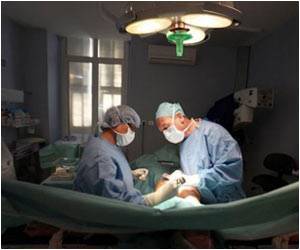Changes in managing patients before, during and after colorectal surgery cut hospital stays by two days and reduced readmission rates.

Among findings published in the May 2014 issue of the journal Anesthesia & Analgesia, the researchers reported that the enhanced recovery approach used for colorectal surgery cut hospital admissions from an average seven days to five, and reduced the rate of readmissions by half.
"Enhanced recovery is about change management," said senior author Tong J. Gan, M.D., MHS, professor of anesthesiology at Duke. "It's getting the team together, including nurses, anesthesiologists, surgeons and patients, with everyone understanding the expectations of how to do things differently and improve patient care."
Gan and colleagues collected data from 241 consecutive patients at Duke University Hospital undergoing open or laparoscopic colorectal surgery during two time periods: before the enhanced recovery approach was implemented, and after. Ninety-nine patients were studied in the traditional approach, and 142 using enhanced recovery.
With traditional perioperative care – defined as the care provided through a patient's hospitalization for surgery – few procedures are standardized, but patients are typically told to fast the night before and undergo laxative treatments, and then are not given food or drink after surgery until bowel sounds are restored, sometimes several days later. Additionally, traditional perioperative care includes a variety of different anesthesia regimens, fluid management and pain control, depending on the surgical team's preferences.
Under traditional perioperative care, patients who experience pain, stress, immobilization, and postoperative constipation can remain in the hospital for 10 days or more, with complication rates of up to 48 percent. Such complications can be expensive, estimated at an average of $10,000.
Advertisement
In the Duke study, patients in the ERAS group were educated about what they should expect. Routine bowel preparation was not performed, and patients were allowed to drink clear fluids until 3 hours before their surgeries, notably a sports drink.
Advertisement
"We have shown that providing care within an ERAS pathway, we are increasing the quality of care for patients while at the same time reducing complications and medical costs," said co-author Timothy Miller, assistant professor of anesthesiology at Duke. "I believe that going forward, enhanced recovery care could become the new standard for best practice."
Gan said the researchers saved costs for about 85 percent of the ERAS patients, at about $2,000 per patient. He said the ERAS approach could be used for numerous surgeries; it has been expanded at Duke University Hospital to include bladder, pancreas and liver surgeries.
"Our study demonstrates that the patient-focused enhanced recovery approach uses evidence-based concepts to decrease perioperative stress and improve outcomes from surgery," said lead colorectal surgeon and co-author, Julie K. Marosky Thacker, M.D.
Source-Eurekalert









